Tukhm-e-Mooli – Radish Seeds Health Benefits

Radish is considered the most common element of salad. Radish, referred to as Raphanus sativus scientifically, is definitely an edible root vegetable that belongs to the family Brassicaceae. It’s got sweet or even stinky flavor along with abundant of juice.There are many different types of radishes, based upon their color, size and time period of cultivation time. Radishes could be white, black, purple or red in color and long, round or even cylindrical in shape. A few radishes are grown because of their seeds, whilst oilseed radishes are grown for oil production. Radish seeds are delicious and could be included with salads for the crispy, spicy taste.Because of therapeutic qualities of seeds, some types of radishes are especially grown for the seeds or even seed pods. Radish seeds are sprouted as well as consumed much like other sprouts. Seed extract may also be used.
Health Benefits of Radish Seeds
Radish seeds or even daikon seeds have been utilized for hundreds of years to deal with numerous health issues. They assist to cure indigestion, decrease fatigue as well as cleanse blood and body. They may be efficiently utilized to cure migraine headache, sore throats, edema, congestion and hangovers. They are also beneficial for bloating, diabetes, acne and cellulite. Radish seeds are helpful to improve immune kidney function, boost immune system as well as boost the circulation of blood. Radish seed oil is utilized to heal as well as soften dry, cracked skin.
Listed here are some well-liked health advantages of Radish Seeds:
1. Wonderful Detoxifying Agent
Radish seeds are excellent detoxifying agents which help in eliminating the damaging toxic materials and free-radicals through the body.
2. Control Blood Pressure
The potassium content of radish seeds works well for reducing down the blood pressure level. Potassium works well for dialating the blood vessels which often energizes the normal blood circulation within the body. Therefore it’s better to include radish seeds in your daily schedule to manage the problem of high blood pressure levels.
3. Improving digestion
Radish is a superb natural source of fiber. This and also the herb’s anti-inflammatory qualities allows it to help your digestive system. Radish seeds assist reduce indigestion as well as bowel problems. By extension, these effects help with the management of hemorrhoids.
4. Rich In Fibre
Radish seeds are full of fibre content which will help in stimulating the entire digestive health. Regular usage of radish seeds works well for dealing with lots of digestive problems which includes constipation. It is therefore preferable to include radish seeds in your routine to enhance your digestive health.
5. Assisting the treatment of diabetes
Radish seeds can affect the rate of blood sugar absorption. The effect is potent enough to be a significant help to diabetics.
6. Lowers The Risk Of Heart Disease
Radish seeds are full of flavonoids which help in lessening numerous cardio vascular illnesses. Regular usage of radish seeds is extremely beneficial in managing the problem of arteriosclerosis. Additionally, radish seeds consumption is extremely valuable in decreasing the chance of heart attack too. As a result it could be smart to include radish seeds in your daily schedule to obtain the advantages.
7. Prevents The Risk Of Cancer
Radish seeds might be among the best methods to avoid the risk of cancer. Research indicates that radish seeds can deal with lots of cancer which includes colon, kidney, oral, intestine and stomach cancers. The anti-oxidant, vitamin C and folic acid content of radish seeds limit the activity of free-radicals and stop the development of cancer cells. Include radish seeds in your routine and stop potential risk of cancer efficiently.
8. Treats Skin Problem
The vitamin B, vitamin C, zinc as well as phosphorus content of radish seeds works winder for the skin and helps in lessening lots of skin problems just like dry skin, rashes, cracks etc. Additionally, usage of radish seeds works well for moisturising the skin from inside and increases the all round skin health.
9. Beneficial for Bones
Radish seeds are full of calcium that is necessary for the overall bone health. Regular usage of radish seeds works well for strengthening the bones and treats lots of bone related difficulties.
10. Good for Jaundice
Radish seeds are extremely beneficial in treating the problem of jaundice. The natural content of radish seeds works well for preventing the problem by removing bilirubin that is in charge of the problem. In addition, usage of radish seeds also encourages the activity of red blood cells by increasing the oxygen supply to them.
11. Kidney Stones
The intake of radish seeds assist in dealing with the problem of kidney stones. Radish seeds due to their diuretic properties assist in dissolving the stones. In addition, radish seeds may also be very useful in clearing the urinary bladder as well as stimulate its functioning. Regular usage of radish seeds is additionally suggested since they assist in enhancing the bowel movement as well as treats problem just like diarrhoea.
12. Cleansing your liver
The liver is really a natural filter which safeguards our bodies. The toxins from food and environment poison it and lower the efficiency of the filter. Radish seeds remove overabundance of bilirubin from the liver and control its production. Additionally they flush harmful toxins from your body. As a result, they may be utilized in a treatment program for jaundice as well as for detox.
Radish Seed Description and History
Lai Fu Zi, since they are recognized in Mandarin, aren’t just essential for growing radishes, but additionally play a vital role in traditional medicine, just as one herb that will help the body heal from numerous problems, like indigestion. Growing in all Chinese provinces, this particular plant has become famous within the 19th century, when Zhang Xi Chun, a world-known physician discussed the advantages of the seeds. After that, radish seed have been grown as well as gathered throughout the summer, together with the reason for being used in a variety of alternative medicine treatments.
The radish seed is acquired by drying the fruits of the plant, rubbing them, as well as cleaning them of all impurities. Once this process is conducted, the seeds are once again let to dry, and could be utilized roasted or raw. The key is to completely smash the seed before utilizing it for decoct. The radish seed consists of fatty oils which help the body function properly, remain healthy as well as fit.
Radish facts
Radish is crop which has a long cultivation history and is widely grown all around the world. This vegetable is a vital ingredient in cuisines such as Chinese, Japanese and Korean. In East Asian countries the crossings of radish have produced variety of cultivars, with variation in the shape of roots.
| Name | Radish |
|---|---|
| Scientific Name | Raphanus sativus |
| Native | Its origination believed to be in Eastern Mediterranean region and domestication in pre-Roman times in Europe. It is cultivated throughout the world and consumed as salad vegetable. |
| Common/English Name | Chinese Radish, Daikon, Common Radish, Fodder Radish, Daikon Radish, Japanese Radish, Garden Radish, Oriental Radish, Leafy Daikon, Radish, Oriental Winter Radish, Wild Radish |
| Name in Other Languages | Arabic: Fijil, Azerbaijan: Turp Brazil: Rabanete Burmese: Monla Chinese: Lai Fu, Croatian: Rotkvica Czech: Ředkev Seta Danish: Radis, Dutch: Ramenas, Esperanto: Rafaneto, Estonian: Redis, Euskera: Erraso, Finnish: Retikka, French: Radis, Galician: Labestro, German: Bierwurz, Greek: Rapani, Hebrew: Tznonit, Hornjoserbsce (Upper Sorbian): Zahrodna Rjetkej Hungarian: Retek Icelandic: Hreðka, India:- Bengali: Mulla, Hindi: Muli, Malayalam: Mullangi, Marathi: Mūlaka, Punjabi: Mūlī, Sanskrit: Muulaka, Tamil: Mullangi, Telugu: Mullangi, Urdu: Mūlī Indonesia:- Malay: Luba, Javanese: Rades, Sundanese: Lobak Berem, Italian: Ravanello, Japanese: Hatsuka Daikon, Khmer: Chhaay Thaw Kurdish: Tūr Korean: Mu Laotian: Kaad Khaaw Latvian: Redīss Lithuanian: Valgomasis Ridikas Malaysia: Lobak Putih, Nepalese: Mulo Norwegian: Reddik Persian: Torobcheh Polish: Rzodkiewka Philippines:- Cebu Bisaya: Rabanos, Tagalog: Labanos, Portuguese: Rabanete, Romanian: Ridiche Russian: Red’ka Posevnaia Sardinian: Ravanella Scots: Reefort Serbian: Trotkvica Slovak: Redkvica, Slovenian: Retvica Spanish: Labrestos, Sri Lanka (Sinhalese): Rabu Swedish: Rädisa Thai:- Chiang Mai: Hua Phak Kat Khao, Central: Phak Kat Hua, Northern: Phak Poek Hua, Turkish: Trup, Vietnamese: Rađi Welsh: Redis |
| Plant Growth Habit | Annual or biennial, glabrous, coarse, scabrous or hispid |
| Growing Climate | Cool climate |
| Soil | Well-drained |
| Plant Size | 30–120 cm |
| Lifespan | One year |
| Stem | tout, erect, branched |
| Leaf | Rosette, pinnate, Length (smaller ones): 13 cm (5 inch) |
| Flower | Purplish, pink – white |
| Seed pods (Fruit) | Indehiscent, lanceolate, cylindrical-conical, Length: 2-12 inch; Young: Green, Mature: Brown |
| Taproot shape and size | Swollen, oblong or globose; 1–100 × 0.5–45 cm |
| Taproot color | White, pink, red, black |
| Taproot flesh | White |
| Weighs | About 60 lb (27 kg) |
| Flavor/aroma | Sharp |
| Taste | Crisp, sweet |
| Seed | 2 to 4 seeds; globose or ovoid, ridged, Diameter: 2.5–4 mm |
| Varieties/Types |
|
| Major Nutritions | Vitamin C (Ascorbic acid) 17.2 mg (19.11%) Vitamin B9 (Folate) 29 µg (7.25%) Copper, Cu 0.058 mg (6.44%) Vitamin B6 (Pyridoxine) 0.082 mg (6.31%) Potassium, K 270 mg (5.74%) Total dietary Fiber 1.9 g (5.00%) Iron, Fe 0.39 mg (4.88%) Iodine 7 µg (4.67%) Vitamin B5 (Pantothenic acid) 0.191 mg (3.82%) Manganese, Mn 0.08 mg (3.48%) |
| Health Benefits |
|
| Calories in 1 cup slices (116 gm) | 19 Kcal. |
| How to Eat |
|
| Other Facts |
|
Tukhm-e-Mooli, Radish Seeds
تخم مولی – بیج مولی – تخم ترب
ماہیت ۔ برصغیر کا مشہور پودا ہے۔مولی مخروطی شکل کی مشہور عام جڑ ہے ۔ اس کا پودا ایک سے دو فٹ تک اونچا ہوتاہے ۔ اس کے پتوں پر رواں ہوتاہے ۔ اس کی جڑ عموماًزمین میں سیدھی ہوتی ہے جوکہ زیادہ سفید لیکن اس کے علاوہ سبز مرچ یا نیلاہٹ لئے ہوئے سرخ ہوتی ہے ۔ اس کے پھول سفید گچھوں میں اسکے بعد پھلیاں لگتی ہیں ۔ جن میں بھورے رنگ کے تخم ہوتے ہیں ۔ یہ تخم رالی کے مشابہ ہوتے ہیں ۔ پتے شلجم کے مشابہ لیکن اسے سے چھوٹے ہوتے ہیں ۔مولی کا مزہ شاداب شوریت مائل اور تیزہوتاہے۔مولی کے پانی اور تخموں کو بطور دواء استعمال کرتے ہیں ۔
اقسام ۔اس کی ایک قسم لمبی اور موٹی ہوتی ہے۔جبکہ ایک چھوٹی قسم کی گول چھوٹے شلخم کی طرح سرخ رنگ کی اندر سے سفید جوکہ بطورسلاد استعمال کراتے ہیں ۔
مزاج ۔ گرم خشک – درجہ دوم ۔
افعال ۔ مدربول ، کاسرریاح ، ہاضم ، نافع بواسیر، محلل ورم طحال ۔
استعمال ۔ مولی کو خام ہونے کی حالت میں تراش کر نمک لگا کر کھاتے ہیں ۔نیز بطور نانخورش پکاکر استعمال کرتے ہیں مولی کو سرکہ میں پرورہ کرکے ورم طحال کو تحلیل کرنے کیلئے کھلاتے ہیں اور مولی کے پانی میں دافع بواسیر اور دمہ کی گولیاں بناتے ہیں اس کے پانی میں چہارم حصہ روغن کنجد ملاکر نرم آنچ پر پکاتے ہیں جب صرف روغن رہ جائے تو اس کو صاف کرکے درد گوش اور طینن دودی کے ازالہ کے لیے قطور کرتے ہیں اور برگ مولی کا پانی نچوڑ کر شکر سرخ سے شیریں کرکے یرقان میں پلاتے ہیں مدر ہونے کے باعث نہایت مفید ہے اور اسی وجہ سے اس کاپلانااستسقاء میں بھی فائدہ دیتاہے نیز سنگ گردہ و مثانہ میں مناسب ادویہ کے ہمراہ استعمال کرتے ہیں ۔ مولی یا اسکے مونگرے یا پتے پچاس گرام مصری یبیس گرام بھوری مرچ پانچ عدد پانی کے ساتھ پیس چھان کر پلانا مسوں کی خارش جلن اور درد رفع کرتاہے ۔ گردہ و مثانہ کی پتھری توڑ دیتی ہے ۔ سدہ جگر کو کھولتی ہے بلغم کو چھانٹتی ہے۔
فوائد خاص ۔ ہاضم،کاسرریاح ۔
مضر ۔ غشیان ۔
مصلح ۔ زیرہ اورنمک ۔
بدل ۔ شلجم ۔
مزاج – مولی کے تخم خشک درجہ دوم ۔
افعال و استعمال ۔ بیرونی طور پر جالی اندرونی طور پر مقئی مدربول اور کاسرریاح تخم مولی کو بلغمی امراض میں جوش دے کر قے لانے کیلئے پلاتے ہیں اور ادرار بول و کاسرریاح کیلئے بھی استعمال کرتے ہیں ۔
تخم مولی بیرونی طور پر جالی ہونے کی وجہ سے چہرہ کی سیاہی جھائیں برص اور بہق کو دور کرنے اور چہرے کا رنگ صاف کرنے کیلئے مناسب ادویہ کے ہمراہ پیس کر ضماد کرتے ہیں ۔ یہ مدربول ہونے کے ساتھ مدر حیض بھی ہیں ۔
فوائد خاص ۔ محلل ریاح ، مدربول ۔
مضر۔ مغشی و مکرب ۔
مصلح ۔ زیرہ ،شہد ۔
بدل ۔ تخم مولی کا سرسوں ۔
مقدارخوراک ۔ تخم مولی ایک سے تین گرام قے لانے کیلئے چھ گرام یا ماشے ۔
آب برگ ترب‘مولی کے پتوں کاپانی ۔ مولی کے پتوں میں قوت ادرار نسبتاًزیادہ ہوتی ہے۔مولی کے پتوں کا پانی شکرملاکر یرقان میں پلاتے ہیں ۔ آب مروق بالعصر صفراء کو مرارہ سے اسی طرح صاف کرتاہے جس طرح ملنیات آمعاء کو بعض اطبا التہاب قناۃ صفراوء اور التہاب مرارہ میں آب مکو مروق آب کاسنی مروق آب ترب سبز مروق اور شربت بذوری ہر ایک چار تولہ استعمال کراتے ہیں
مقدارخوراک ۔ چالیس سے ساٹھ گرام تک ۔
نمک مولی یا مولی کانمک ۔ مولی کے پتوں اور جڑ کا بطریق معروف نمک نکالاجاتاہے ۔ نمک مولی مشہور ہاضم دور ہے۔اسکے علاوہ اس کو سنگ گردہ و مثانہ کو خارج کے لئے کھلاتے ہیں اور اس میں حجر الیہود کو کشتہ کیاجاتاہے ۔
مولی کے پانی میں کھرل کرکے ابرک کا عمدہ کشتہ دس بار آنچوں میں تیار ہوجاتاہے ۔
مقدارخوراک ۔ چاررتی سے ایک گرام ۔


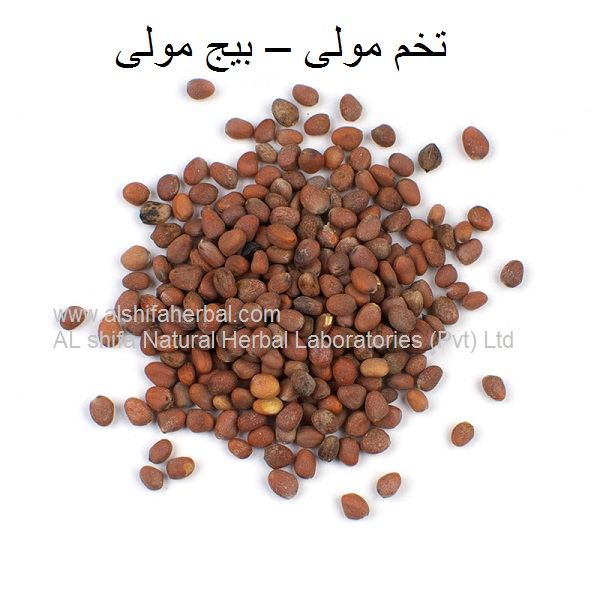
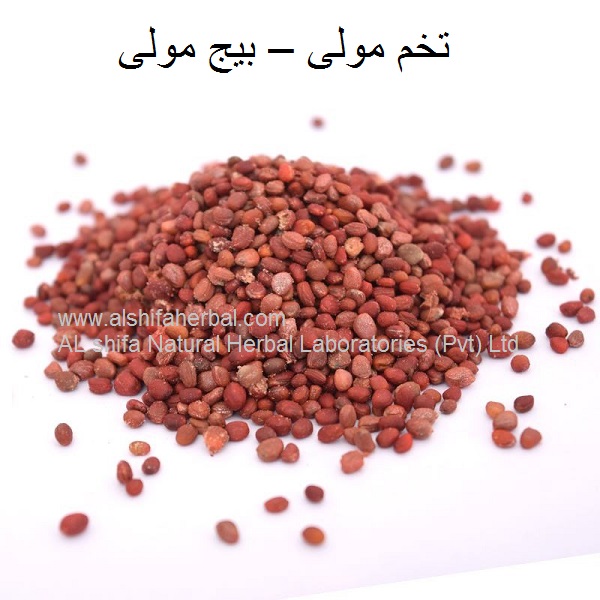
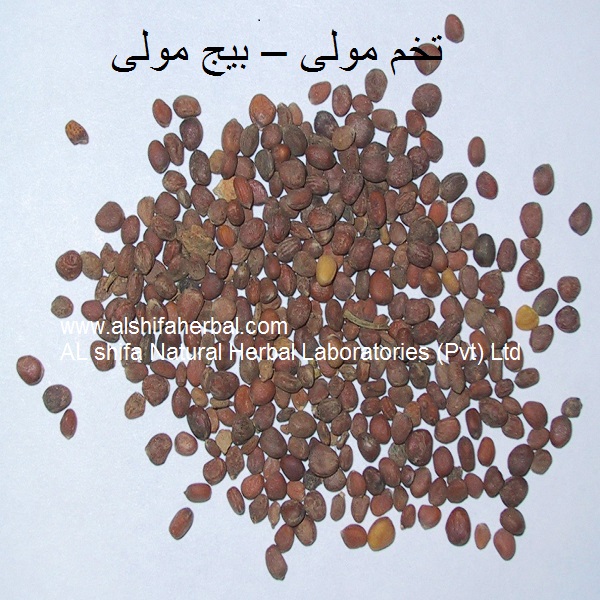
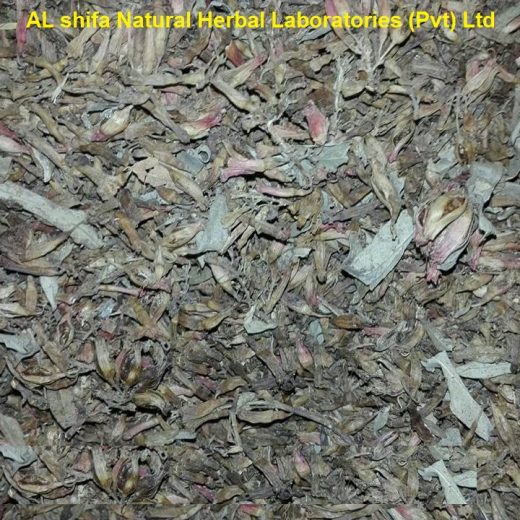
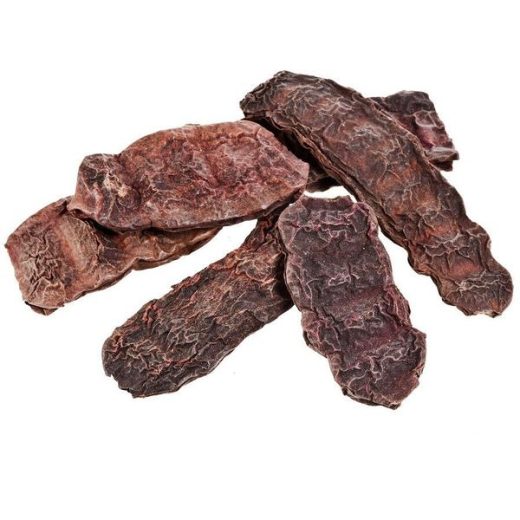
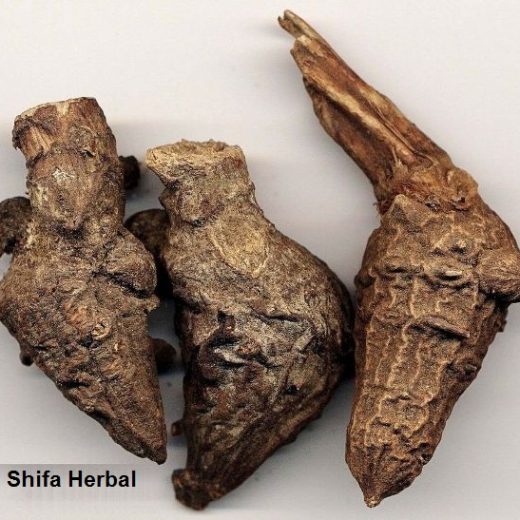



Reviews
There are no reviews yet.